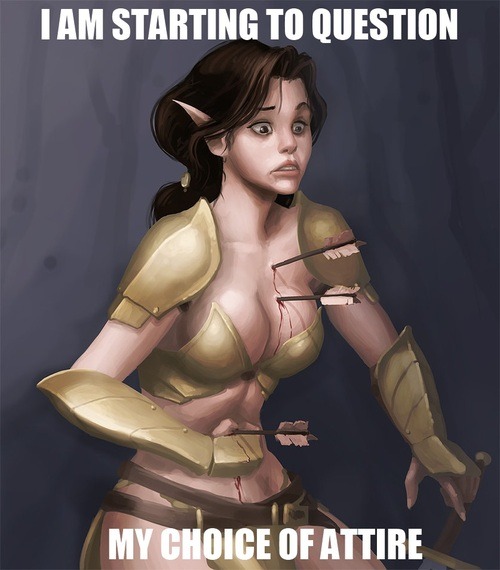Hussar
Legend
/snip I'd rather see armored females like on http://womenfighters.tumblr.com/ than the typical Red Sonja style chainmail bikini.
/snip
Thanks for the link:

/snip I'd rather see armored females like on http://womenfighters.tumblr.com/ than the typical Red Sonja style chainmail bikini.
/snip

Ummm, I did tell someone who PMed me something ridiculous to go back to Stormfront where he'd feel more at home, so I think we crossed that line.At least we haven't had anybody call somebody else "Hitler" in this thread.
Isn't that another internet rule - the longer a thread goes, the more likely it is that somebody is called "Hitler" by another poster?
I personally believe that holding artwork to the same moral dimensions as reality is the first step towards the justification of censorship (e.g. "we need to suppress this because it could corrupt the youth"). I believe that, if you find some artwork to be personally distasteful, it's enough to simply ignore it, as it's not hurting anyone.









 A woman by the name of Walpurgis depicted in a 1300 Fechtbuch training with sword and buckler.
A woman by the name of Walpurgis depicted in a 1300 Fechtbuch training with sword and buckler.I find this argument very strange on a couple of levels. Ironically, you argue for the suppression of criticism by drawing a straight line from criticism to censorship; then you argue, in essence, that art is powerless and frivolous.
The first is an argument that free speech and opinion is one way. If I choose to express an idea in my art - "Chicks with swords should be sexy!" - then, in essence, I get a free no-tagbacks, because anybody who finds that expression distasteful ought (in your argument) to simply shut up and turn away if they don't like it; if they say "That's lame" or "Your idea offends me," then I can raise the specter of suppression and censorship to, in effect, close down THEIR right to express an opinion.
The second assumes art cannot do anything other than entertain. You present the inverse argument (e.g., violent video games/art lead inexorably to violence), point out that is flawed, and then flip it around to say that art therefore has no influence in any way. I...think that kind of misses the point of art, no? And it's also very dismissive of gaming as a medium.
So who says a Halfling can't have extraordinary strength!?!? Just look at Le Maosheng!
All kidding aside, my saying that it's enough to ignore artwork was meant to convey that it was "enough" in relation to calling for its suppression, not for discussing the thing itself; if I didn't make that clear before, then that was an error on my part. If you don't care for some art, by all means you should be able to (civilly) talk about it - it's when you say that that art shouldn't exist (or otherwise should be censored) because you find it immoral, that I think you've started to express a hostile intent. In that case, it's better to simply not pay attention to it.
Remember, this is a deontological argument. Creating artwork, whatever the art may be, has no moral dimension - it neither violates a negative duty nor fulfills a positive one. The suppression of creative expression, on the other hand, violates one of the negative duties (e.g. do not suppress creative expression), and so is immoral.
I'm with Alzrius on this. I most enjoy games when they are as realistic as possible, where the fantasy elements are limited to what the game is about. As a simplistic example, D&D is about fighting monsters with magic and swords, so I expect fantastic monsters and magic, but not normal humans with the ability to jump over buildings.
So men being stronger than women in-game sounds just fine to me, unless a main theme of my game is "What if women were as strong as men?" Though if a player came to me and said "I want to play a woman fighter who's as strong as a man" that would be just fine too, as that's obviously a theme that player wants to address in the game.
